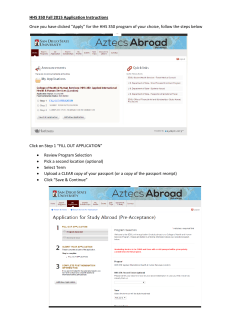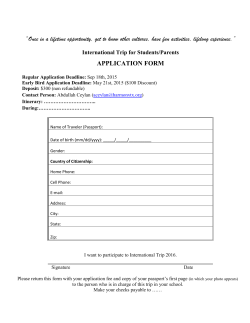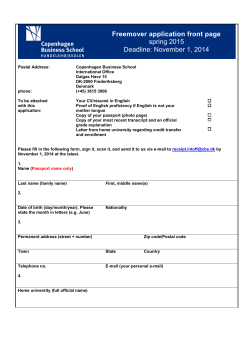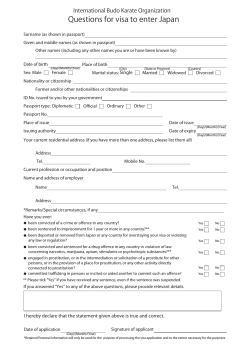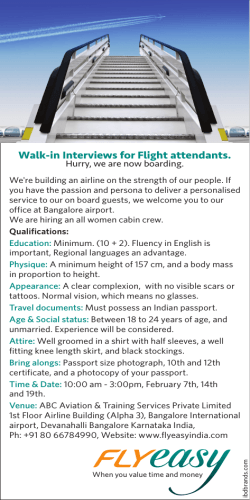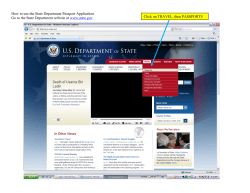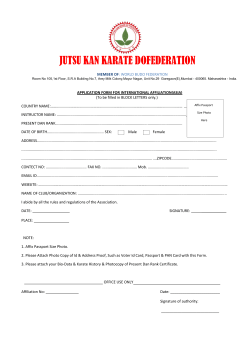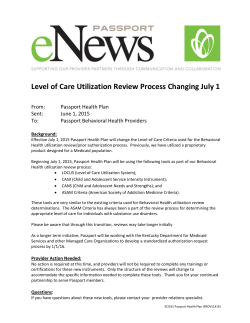
here - Planetree
HARVEY PICKER CENTER OF INNOVATION AND APPLIED RESEARCH IN LONG TERM CARE 2015/2016 APPLIED RESEARCH PROGRAM REQUEST FOR PROPOSALS HARVEY PICKER CENTER STEERING COMMITTEE Lynda Crandall, RN, GNP Acting Executive Director Pioneer Network Jill Harrison, PhD Health Services Research Planetree David Edvardsson, PhD Associate Professor, Department of Nursing La Trobe University Wendy Prins, MPH, MPT Senior Director, National Priorities Partnership National Quality Forum Heidi Gil, NHA Senior Director of Quality & Innovation Connecticut Central Senior Services Judah Ronch, PhD Dean and Professor Erickson School of Aging University of Maryland-Baltimore County Lucile Hanscom Immediate past Executive Director Picker Institute Jennie Chin Hansen, RN, MSN, FAAN Chief Executive Officer American Geriatrics Society Ruta Kadonoff, MA, MHS Vice President of Quality and Regulatory Affairs American Health Care Association/National Center for Assisted Living Susan Frampton, PhD President Planetree Carol Spence, PhD, RN Vice President, Research & Quality National Hospice & Palliative Care Organization PLANETREE/HARVEY PICKER CENTER STAFF Lorena Bedoya, Project Coordinator Planetree Tel: 203.732.1360 Email: [email protected] 130 Division Street Derby, CT 06418 1 PURPOSE The purpose of the Harvey Picker Center of Innovation Applied Research Program is to provide annual grants to support innovative research projects designed to advance the development of personcentered cultures and implementation of person-centered care across the spectrum of long-term care settings and services. The expected outcome of a grantee’s project will be a demonstration, including a robust dissemination plan, of the measurable effects, affordability, sustainability, and reliability of the effort to advance person-centered cultures and/or the implementation of person-centered care. The project must be consistent with one or more of the Planetree or Picker Principles of Patient-Centered Care. MISSION The Harvey Picker Center of Innovation & Applied Research in Long Term Care is a Planetree-operated hub of person-centered long-term care research, policy, and practice, which developed through a longstanding collaborative relationship with the Picker Institute. The mission of the Harvey Picker Center is to facilitate the paradigmatic cultural shift to person-centered excellence across the global spectrum of long-term care settings and services. This will be accomplished by merging the views of long-term care service users and providers with those of research, policy and practice experts, in identifying critical barriers to person-centered excellence, and by providing financial and educational support to address these critical issues through a program of innovation and applied research. PROPOSALS SOUGHT The Harvey Picker Center of Innovation Applied Research Program is seeking proposals that aim to advance person-centered care in post-acute and long-term care supports and services. Specifically, proposals attending to the design and application of the Patient Passport, a tool originally developed by the National Quality Forum's (NQF) Patient and Family Engagement Action Team, to support advancements in long-term care supports and services are encouraged. Community based agencies, home care, and other post-acute providers are encouraged to apply. Additionally, the Planetree Patient Preferences Passport, an iteration of a patient passport created by the National Quality Forum's Patient and Family Engagement Action Team, is designed to provide a vehicle for capturing patients’ personal preferences as they relate to their healthcare, their health and well-being and their goals. The Planetree Passport serves multiple purposes. It: Prompts patients to give consideration to their preferences for care and treatment and to document those preferences for healthcare professionals and family members in advance of any care episode when conveying this information may be unmanageable. 2 Opens the door for healthcare professionals to initiate discussions with patients about potentially sensitive and highly-charged topics such as advanced directives in a non-threatening way. Promotes partnership between patients and their caregivers by creating a basis for discussion and shared decision-making influenced by the documented patient preferences. Encourages a more holistic approach to healthcare by imparting crucial self-reported patient information that extends beyond vital signs, diagnoses and medication records. Provides accurate, up-to-date information about the patient that helps create an informed, meaningful dialogue with the provider and prevents misdiagnosis and wasted time - this includes both incoming and outgoing information - medical and socio-demographic information - that helps the care team think about transitions and ultimately helps to prevent readmissions. The Patient Passport is also available in an electronic version through Doctella, an app co-developed by Peter Pronovost, a physician who directs a patient safety and quality institute at Johns Hopkins Medicine, in Baltimore. Please visit https://www.doctella.com/ for more information. The Patient Passport tool has the potential to support better outcomes in long-term care services and supports related to transitions of care, patient education, and readmissions to the hospital, among others. We invite creative proposals that seek to adapt these examples of Patient Passport tools, in paper or electronic versions, for meaningful use in long-term care. We encourage applicants to review necessary background information on the Patient Passport concept prior to submitting their application. Background information on the Patient Passport Tool, developed by NQF, and a PDF of the tool itself is available here: http://www.qualityforum.org/Patient_Passport.aspx A recent Wall Street Journal article describing the Patient Passport Tool is available here: http://www.wsj.com/articles/patient-passports-make-sure-people-with-complex-cases-areheard-1422918741 Additional articles on Planetree’s Patient Passport Tool are available here: http://planetree.org/planetalk/the-planetree-patient-preferences-passport/ http://planetree.org/planetalk/why-you-need-a-passport-in-the-emergency-room/ Successful proposals will also address one or more of both the Planetree and Picker Principles of PatientCentered Care and will embody the following four characteristics: Applicable across a range of long-term services and supports Replicable implementation and evaluation processes Affordable for long-term services and supports with limited financial resources Sustainable beyond the life of the grant 3 FUNDING LEVEL During the 2015/2016 grant cycle, deserving proposals that pursue the goals outlined in this RFP will receive funding for a project period of up to one year. The Steering Committee has allocated up to $40,000 U.S. dollars for this year’s grant cycle. The total project amount may be equal to or greater than the amount you are requesting from the Harvey Picker Center. The Steering Committee reserves the right to support four smaller projects (i.e.-four awards of $10,000) or one larger award for $40,000 based on the quality of the proposals received. Grantees and/or their institutions will be required to provide (at a minimum) one 100% matching contribution to the proposed project in the form of financial resources, committed and dedicated measurable time by project staff, other approved matching commitments, or all of the above. A letter of support is required from the grantee’s organization stating the intention to provide the matching funds. Of note: Grant funding is provided specifically for research purposes and does not cover costs related to attending conferences or symposia. Funding for these purposes should be allocated to “grantee costs”. ELIGIBILITY The following categories of organizations are eligible to apply: Community based agencies, home care, and other post-acute providers Long-term care settings and service providers Higher Education Institutions, including Public and Private Institutions of Higher Education, with a curricular focus on long-term care services and supports Nonprofit organizations whose mission is specific to providing post acute and long-term care services and supports KEY DATES: 2015/2016 HARVEY PICKER CENTER OF INNOVATION APPLIED RESEARCH PROJECT GRANT CYCLE DATE MILESTONE JULY 25, 2015 DEADLINE FOR SUBMITTING FULL PROPOSAL OCTOBER 9, 2015 ANNOUNCEMENT OF AWARDS JANUARY 1, 2016 - DECEMBER 31, 2016 GRANT PROJECT CYCLE (SUBJECT TO RECEIPT OF SIGNED GRANT AGREEMENT) JULY 1, 2016 SUBMIT INTERIM PROJECT PROGRESS REPORT OCTOBER, 2016 PRESENT PROJECT IN PROCESS AT PLANETREE ANNUAL CONFERENCE IN BOSTON JANUARY 15, 2016 SUBMIT PROJECT FINAL REPORT FEBRUARY-MARCH 2016 PRESENT COMPLETED PROJECT IN PLANETREE WEB EDUCATION SEMINAR 4 APPLICATION PROCESS: PROPOSAL SUBMISSION DEADLINE: JULY 25, 2015 Full proposals must include the following required materials: o Cover Sheet; this two-page document is available at the end of this RFP o Project Description (word limit: 3,000 words); see below for detail on what to include o IRB statement; if required by grantee’s organization o Implementation Timeline o Budget o CV for the Principal Investigator and Bio-sketches for project staff o Letters of Support Project description (not to exceed 3,000 words): 1. Project Rationale: Provide a concise rationale stating the fundamental need the project will address in terms of applying the Patient Passport tool in long-term care services and supports. 2. Literature Review: Summarize current knowledge on the project topic and explain how the project will fill a knowledge gap. 3. Person-Centered Aims: Identify the Planetree and Picker Principles of Patient-Centered Care that this project will address. 4. Stakeholder Engagement: Describe how residents, families, and/or direct care staff are engaged in the project. 5. Implementation Strategy: Describe the specific strategies, programs, or interventions that will be implemented to adapt/test the Patient Passport in long-term care. 6. Outcomes and Evaluation: Applicant must describe the expected outcomes of the project and the specific plan to evaluate the outcomes. 7. Educational Value: Describe the educational value and deliverables that will derive from the project. 8. Sustainable, Affordable, Replicable, and Applicable: Explain how the project will be sustained after the grant funding is completed; describe the potential for project replication and application in other long-term care contexts; describe financial implications of replication. 9. Dissemination: Describe how the work and results of the project will be disseminated. Required dissemination protocol include: (A) Presentation at the Planetree 2015 annual conference in Boston, Massachusetts, and (B) Participation in a Planetree Web Education seminar after completion of the project in 2016. 5 Institutional Review Board statement: If required by your institution, please indicate whether an IRB has approved the project, or if an application has been submitted for IRB approval. If IRB approval is required and has not been obtained, provide a timeline for review and approval. Project Timeline including Milestones: Provide a project timeline including Milestones. There is no required format for this timeline, but a Gantt chart is appropriate. Be sure to include in the timeline all major activities and deliverables and estimated dates for each. Budget: Budget should include costs associated with implementation, evaluation and dissemination. Indirect Cost Rate: Planetree allows for grant funds to cover indirect/overhead costs at a rate not to exceed 8% of total direct costs. The 8% indirect cost rate is included within the grant fund. The 8% allowance is intended to include space rental, furniture, equipment, heat, electricity, accounting services, library services and the like. Subcontracts with an institution and direct educational support (including fellowships, scholarships, tuition and stipends) are excluded from the indirect cost calculation. Matching Grant Requirement: The grantees and/or their institutions are required to provide (at a minimum) a 100% matching contribution in the form of financial resources and/or committed and dedicated measurable time by project staff. The budget must clearly detail how the applicant or applicant’s institution proposes to fulfill this requirement. Evidence of Institutional Support: A letter of commitment and support is required from the Department Chair or other designated (authorized) institutional official to ensure institutional support for the proposed work. As a demonstration of support, this letter must include an agreement on project cost-sharing (see budget information for details). Curriculum Vitae/Bio-sketches: A short (no more than 4 pages) CV for the Principal Investigator(s) needs to be included. The CV should include education, residency, fellowships, positions held, and relevant presentations and publications, along with any other relevant accomplishments. Short biosketches for each primary project staff member; these should be no more than one page and should focus on experience applicable to the proposed project. PROPOSAL SUBMISSION It is required that submission of all the materials related to the proposed project be sent in one electronic document by e-mail to Planetree ([email protected]). All complete applications must be received by the July 25, 2015, deadline at 5pm EST. CONTACT Ms. Lorena Bedoya, Project Coordinator, Planetree Tel: 203.732.1360 Email: [email protected] 130 Division Street Derby, CT 06418 6 PROPOSAL REVIEW AND SELECTION PROCESS Proposals will be reviewed by the administrative offices of Planetree to ensure eligibility. An expert review committee, convened by Planetree, will then evaluate proposals using the following criteria: 1. Contribution to Person-Centeredness. To what extent will this project make a substantial contribution to person-centeredness of long-term care services and supports? 2. Active Stakeholder Engagement. To what extent are long-term care residents and other clients, their family/significant others, staff/employees of long-term care organizations, and local community members/groups meaningfully engaged in the project? 3. Project Design. To what extent is the project design appropriate? 4. Transportability. To what extent is the proposed work applicable and replicable across the spectrum of long-term care supports, services, and settings? 5. Educational Value: To what extent does the proposed work have value for educating key personcentered long-term care stakeholder groups and include a clear strategy for educational application/delivery to these groups? 6. Leadership Support. To what extent does the proposal exhibit having the support of relevant organizational leadership? 7. Team Strength. To what extent does the applicant team exhibit the capacity to successfully conduct the proposed research, including gaining access to any research participants; conducting any data collection, analyses, and interpretation; reporting and disseminating results; and maintaining financial records? 8. Sustainability. To what extent will the project be sustained beyond the one-year grant? 9. Fiscal Responsibility. To what extent is the project budget adequate to support the proposed work, including potential but unforeseeable costs, such as those associated with research participant recruitment and turnover, while also addressing the need for healthcare affordability? 10. Effective Dissemination Plan. To what extent does the proposal specify who the targets are of dissemination efforts, the approaches for how these targets will be reached, and the projected impact of these dissemination efforts? Evaluation of grant proposals by the Harvey Picker Center Review Committee will guide final selection of proposals for the grants. Proposals deemed ineligible will not be accepted. Planetree will send notice to the applicant that their proposal has been rejected for failure to follow guidelines. The actual number of grants awarded will depend on the nature, quality and level of requests received. 7 TERMS AND CONDITIONS Grants will be contingent on the mutual agreement of Planetree and the grantee to applicable terms and conditions of grants, such as provision of proof of matching contribution, right to review and comment on potential publications, grantor acknowledgment, prior approval requirements, required fiscal and progress reports and so forth. 8 PLANETREE PRINCIPLES OF PATIENT-CENTERED CARE COMPONENTS OF THE PLANETREE MODEL I. Human Interactions/Independence, Dignity and Choice Through human beings caring for other human beings a healing environment is created for patients, residents, families, and staff members. This includes providing personalized care for patients, residents and their families as well as creating organizational cultures which support and nurture staff. A Planetree continuing care community offers a range of options that support an individual’s autonomy, lifestyle and interests. Residents direct their care and consistent caregiving teams are assigned to strengthen relationships. II. Importance of Family, Friends and Social Support Social support is vital to good health without regard to the setting. Planetree encourages involvement of family and friends whenever possible, offering patient directed visiting, including in the ICU and ER, and encourages the option of family presence during invasive procedures and resuscitation. The Care Partner Program promotes a heightened level of family participation while patients are hospitalized and at home after discharge. Families are encouraged to stay overnight whenever possible. Beyond the human family, pet therapy can elevate mood, lower blood pressure and enhance social interaction. III. Patient/Resident Education and Community Access to Information Illness is seen as an educational and potentially transformational opportunity. An open chart policy encourages patients to read their medical records. Patients may write in Patient’s Progress Notes in their medical record and may participate in a self-medication program enabling them to keep medications at the bedside. Collaborative care conferences, patient pathways, and a variety of educational resources provide patients and residents with information and skills to actively participate in their care as well as maximize their physical and psychological well-being. Patient and family libraries along with Internet access are available and Planetree Health Resource Centers are open to the community and offer health and medical information on a wide range of topics. IV. Healing Environment: Architecture and Interior Design The physical environment is vital to healing and well-being. Each hospital and continuing care community is designed to incorporate the comforts of home, clearly valuing humans, not just technology. By removing architectural barriers, the design encourages patient and family involvement. An awareness of the symbolic messages communicated by the design is an essential part of planning. Spaces are provided for both solitude and social activities, including libraries, kitchens, lounges, activity rooms, chapels, gardens and overnight accommodation for families. V. Nutritional and Nurturing Aspects of Food Nutrition is integral to healing, essential not only for good health but also as a source of pleasure, comfort and familiarity. A flexible dining program that encourages fellowship is particularly relevant in continuing care settings. Healthcare organizations become role models for delicious, healthy eating, 9 with kitchens available throughout the facility to encourage families to bring the patient’s favorite food from home or prepare meals for themselves. Volunteers bake breads, muffins and cookies to provide “aromatherapy” and to create a nurturing environment. VI. Arts Program/Meaningful Activities and Entertainment Planetree recognizes that people need opportunities for camaraderie, laughter and creativity and a variety of classes, events, music, storytellers, clowns, and funny movies create an atmosphere of serenity and playfulness. Artwork in patient rooms, treatment areas and residential spaces add to the ambiance. Art carts enable patients to select the artwork of their choice. Volunteers work with patients and residents who would like to create their own art, while artists, musicians, poets and storytellers from the local community help to expand the boundaries of the health care facility. In continuing care settings, staff plans and participates in activities to build fellowship. VII. Spirituality and Diversity Planetree recognizes the vital role of spirituality in healing the whole person. Supporting patients, residents, families and staff in connecting with their own inner resources enhances the healing environment. Chapels, gardens, labyrinths and meditation rooms provide opportunities for reflection and prayer. Chaplains are seen as vital members of the health care team. VIII. Importance of Human Touch Touch reduces anxiety, pain and stress benefiting patients, residents, families and caregivers. Training programs for staff and family caregivers and volunteers to learn hand and foot rubs and internship programs for massage therapists keep costs minimal. IX. Integrative Therapies/Paths to Well-Being Expand the choices offered to patients and residents beyond western scientific care. Aromatherapy, acupuncture and Reiki are examples of expanded options offered in addition to clinical modalities of care. To meet growing consumer demand for complementary therapies, Planetree affiliates have instituted heart disease reversal programs, guided imagery, therapeutic touch, acupuncture, Tai Chi and yoga. Aromatherapy’s calming effect on agitated patients is useful to augment pain management modalities and decrease anxiety. Exercise facilities customized for seniors offer programs to improve strength, balance and fitness. Wellness programs focus on prevention and chronic disease management. X. Healthy Communities/Enhancement of Life’s Journey Working with schools, senior citizen centers, churches and other community partners, hospitals are redefining healthcare to include the health and wellness of the larger community. Choosing environmentally friendly cleaning products and sponsoring “kid’s camps”, walking clubs, and community gardens, expands the role of hospitals from treating illness to promoting wellness. Continuing care communities offer opportunities for personal growth, self-expression and fulfillment of individual dreams. Life Stories programs capture milestones in a resident’s life and enable caregivers to see a whole person, nurturing a bond with residents. 10 PICKER PRINCIPLES OF PATIENT-CENTERED CARE Respect for patients’ values, preferences and expressed needs Patients want to be kept informed regarding their medical condition and involved in decisionmaking. Patients indicate that they want hospital staff to recognize and treat them in an atmosphere that is focused on the patient as an individual with a presenting medical condition. Illness and medical treatment may have an impact on quality of life. Care should be provided in an atmosphere that is respectful of the individual patient and focused on quality-of-life issues. Informed and shared decision-making is a central component of patient-centered care. Provide the patient with dignity, respect and sensitivity to his/her cultural values. Coordination and integration of care Patients, in focus groups, expressed feeling vulnerable and powerless in the face of illness. Proper coordination of care can ease those feelings. Patients identified three areas in which care coordination can reduce feelings of vulnerability: Coordination and integration of clinical care Coordination and integration of ancillary and support services Coordination and integration of front-line patient care Information, communication and education Patients often express the fear that information is being withheld from them and that they are not being completely informed about their condition or prognosis. Based on patient interviews, hospitals can focus on three kinds of communication to reduce these fears: Information on clinical status, progress and prognosis Information on processes of care Information and education to facilitate autonomy, self-care and health promotion Communication should always be empathetic and take in to account how a patient may react and interpret such information Physical comfort The level of physical comfort patients report has a tremendous impact on their experience. From the patient’s perspective, physical care that comforts patients, especially when they are acutely ill, is one of the most elemental services that caregivers can provide. Three areas were reported as particularly important to patients: Pain management Assistance with activities and daily living needs Hospital surroundings and environment kept in focus, including ensuring that the patient’s needs for privacy are accommodated and that patient areas are kept clean and comfortable, with appropriate accessibility for visits by family and friends 11 Emotional support and alleviation of fear and anxiety Fear and anxiety associated with illness can be as debilitating as the physical effects. Caregivers should pay particular attention to and engage their patients in dialogue around such issues as: Anxiety over clinical status, treatment and prognosis Anxiety over the impact of the illness on themselves and family Anxiety over the financial impact of illness Involvement of family and friends Patients continually addressed the role of family and friends in the patient experience, often expressing concern about the impact illness has on family and friends. These principles of patient-centered care were identified as follows: Accommodation, by clinicians and caregivers, of family and friends on whom the patient relies for social and emotional support Respect for and recognition of the patient “advocate’s” role in decision-making Support for family members as caregivers Recognition of the needs of family and friends Continuity and transition Patients often express considerable anxiety about their ability to care for themselves after discharge. Meeting patient needs in this area requires staff to: Provide understandable, detailed information regarding medications, physical limitations, dietary needs, etc. Coordinate and plan ongoing treatment and services after discharge and ensure that patients and family understand this information Provide information regarding access to clinical, social, physical and financial support on a continuing basis Access to care Patients need to know they can access care when it is needed. Attention must also be given to time spent waiting for admission or time between admission and allocation to a bed in a ward. Focusing mainly on ambulatory care, the following areas were of importance to the patient: Access to the location of hospitals, clinics and physician offices Availability of transportation Ease of scheduling appointments Availability of appointments when needed Accessibility to specialists or specialty services when a referral is made Clear instructions provided on when and how to get referrals 12 Harvey Picker Center of Innovation & Applied Research in Long-Term Care Cover Sheet 2015/2016 Applied Research Grant Program Matching Grant Project Proposal Project Title Principal Investigator Title Department Institution Applicant Contact Information Mailing Address Telephone Number Telephone Number (Alt) Email Address Institutional Contact Information (person authorized to sign Grant Agreement) Name Title Telephone Number Email Address 13 2015/2016 Applied Research Grant Program Matching Grant Project Proposal Area of Specification Description Project Title Briefly describe your project Describe the basic plan for implementation Describe the evaluation plan Requested Grant Funding Amount Matching Grant Funds 14
© Copyright 2026

